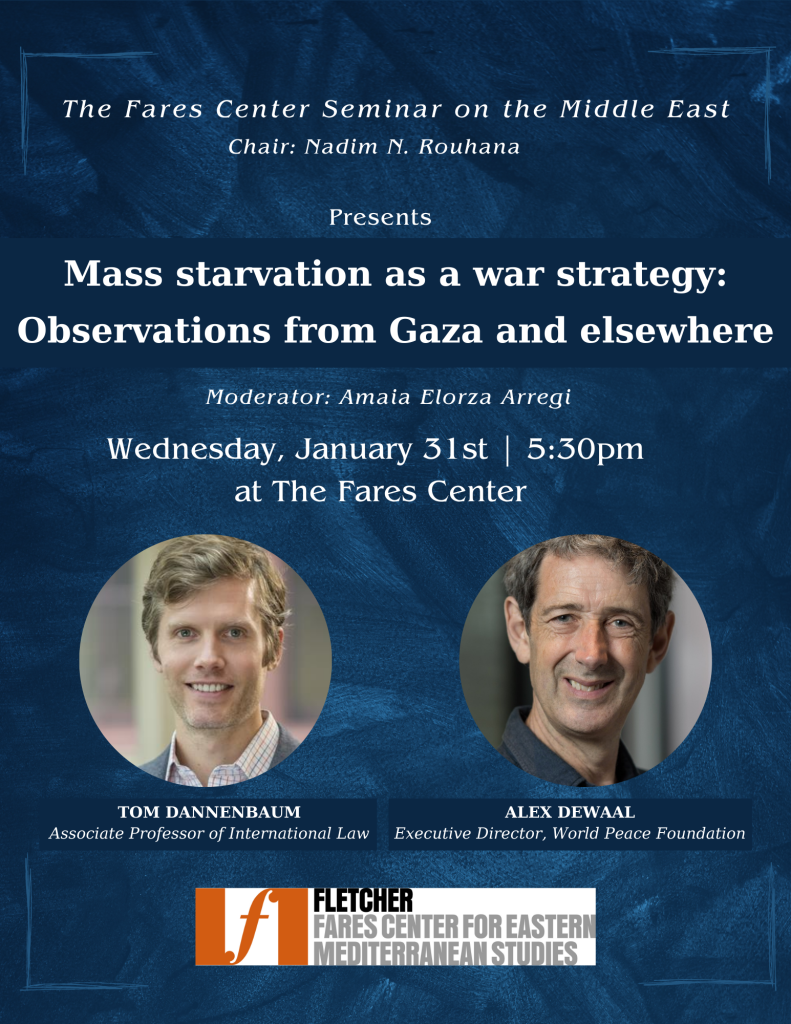
Mass Starvation and Repercussions of the ICJ’s Provisional Measures Order on Gaza with Professors Alex deWaal and Tom Dannenbaum
The Fares Center Seminar on the Middle East:
Mass Starvation and Repercussion of the ICJ’s Provisional Measures Order on Gaza
January 31st, 2024 | 5:30 PM | Cabot 702
Speakers: Tom Dannenbaum (Associate Professor of International Law), Alex De Waal (Executive Director, World Peace Foundation)
Chair: Nadim N. Rouhana | Moderator: Amaia Elorza Arregi
On Wednesday, January 31st, the Fares Center hosted Professor Tom Dannenbaum and Executive Director of the World Peace Foundation Alex De Waal, to discuss the issue of mass starvation and the repercussions of the International Court of Justice’s (ICJ) provisional measures order on Gaza.
In his opening remarks, Prof. Dannenbaum explained the differences between the ICJ and the International Criminal Court (ICC) in terms of their respective legal backgrounds, scopes, and authority. He explained that the mass starvation taking place in Gaza falls under the categories of War Crimes and Crimes Against Humanity and is within the jurisdiction of the ICC due to Palestine’s ratification of the ICC Statute, as has been affirmed by one of the Court’s Pre-Trial Chambers. The area of jurisdictional overlap between the ICJ and ICC is on Genocide, which is the prohibition at issue in the ICJ’s provisional measures. He emphasized that international law does not mandate the provision of evidence of malnutrition or famine in order to establish the crime of starvation as a method of warfare. He further noted that even if Israel’s actions are intended to target combatants, starvation as a method of warfare is being deployed against Gaza’s population as a whole, which retains its civilian status. He pointed out that in the absence of a unilateral suspension of military operations in Gaza, aid delivery to Gaza’s starving population will be practically impossible. This, Dannenbaum noted, has serious implications for Israel’s ability to make good on the provisional measures issued by the ICJ in the preliminary stage of the South Africa v. Israel genocide case.
De Waal continued by addressing the broader question of starvation in instances of humanitarian crises, drawing upon cases from other regions in addition to the current crisis in Gaza. He described the transformation of the mandate of the Integrated Food Security Phase Classification (IPC)—the authority body evaluating food insecurity—from providing evaluations of famine retroactively to assessing cases in real-time. This shift is in part attributed to the need to identify, and mobilize action toward, cases of extreme food insecurity that do not yet meet the IPC’s ‘famine’ threshold, but where thousands are nevertheless at risk of death due to starvation. De Waal emphasized that while the provision of humanitarian aid is a necessary condition for decreasing the intensity of the current humanitarian crisis, the impacts of starvation as a method of warfare will continue to pose serious risks to Gaza’s population long after aid has been received in Gaza and hostilities have ceased. Following their remarks, a Q&A session took place, in which panelists discussed questions on the judicial process in the ICJ regarding the South Africa v. Israel genocide case, how this event compares to other precedence-setting cases in other parts of the world, the role of the UN Security Council, political and genocidal intent, and the potential consequences of the war moving forward.

